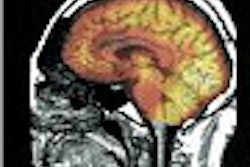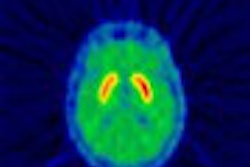Thousands of thyroid cancer patients are treated with iodine-131 (131I), which often diminishes or eliminates tumors. But questions remain regarding the isotope's effect on healthy parts of the body. Prolonged exposure to radiation allows it to infiltrate blood and tissues, with possible serious side effects.
German researchers recently conducted a large study using recombinant human thyroid-stimulating hormone (rhTSH) before diagnostic scintigraphy with 131I, and found that rhTSH significantly reduces 131I’s effective half-life, and therefore the potential harmful effects of radiation.
The Food and Drug Administration approved rhTSH for diagnostic purposes in 1998, due to its ability to stimulate uptake of radioiodine into thyroid remnants and metastases of thyroid cancer, thereby improving diagnostic results. It has also been used prior to 131I treatment instead of withdrawing patients’ thyroid hormone (thyroxine), which leaves patients in an uncomfortable hypothyroid state.
Researchers in the department of nuclear medicine at Johann W. Goethe University Hospital in Frankfurt examined 227 patients, 163 of whom were prepared for the therapy by thyroid hormone withdrawal and 64 of whom received rhTSH stimulation prior to therapy.
The study, published in the Journal of Nuclear Medicine, found that the mean effective half-life of radioiodine was 26% shorter in patients who received rhTSH before therapy (JNM, July 2003, Vol. 44:7, pp.1065-1068).
All patients had thyroidectomies and had only small thyroid remnants, tumor recurrences, or metastases. Thus, thyroid influence on iodine clearance was miniscule.
They found that patients subjected to thyroid hormone withdrawal retained 131I longer, because iodine is principally cleared through the kidneys, and renal blood flow and filtration are reduced in a hypothyroid state. Patients who received rhTSH maintained normal renal clearance rates, and had lower radiation levels in their blood and tissues.
These 131I tests are needed frequently during the follow-up for differentiated thyroid cancer (DTC), so using rhTSH for exogenous thyroid-stimulating hormone stimulation before therapy spares the patient hypothyroid discomfort and reduces the time the patient will not be able to work or function efficiently. In addition, patients who cannot tolerate a hypothyroid phase can now be investigated more easily.
The study did not address the question of whether rhTSH administration reduces the effectiveness of 131I in destroying the targeted cancer.
By Robert BruceAuntMinnie.com contributing writer
July 22, 2003
Related Reading
For thyroid applications, iodine-123 looks great, less stunning, October 21, 2002
I-131 Ablation for Thyroid Neoplasms, April 3, 2002
I-131 for thyroid cancer discussion, August 29, 2001
Copyright © 2003 AuntMinnie.com




















